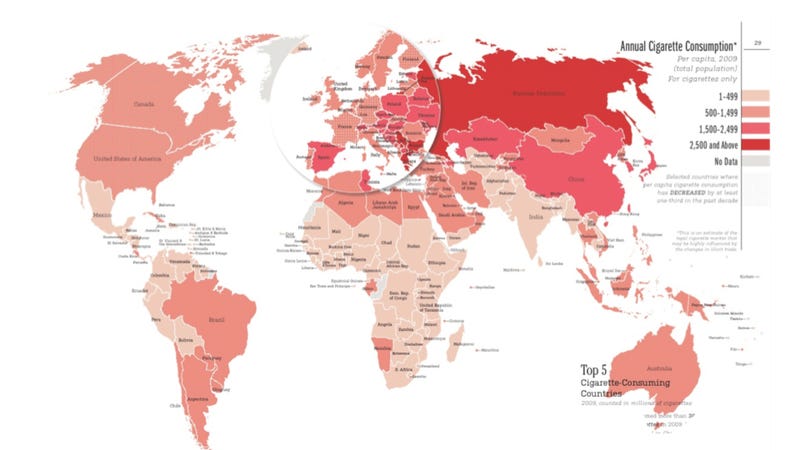World health situation of smokers is scary.
Imagine, about 5.7 trillion (5,700,000,000,000) cigarettes were smoked
worldwide in 2016. Although overall consumption has declined slightly over the
past few years, the future path of global tobacco control is still uncertain.
Despite the rhetorical commitment of some in the tobacco industry toward a
smoke-free world, all major tobacco companies continue to aggressively
advertise cigarettes and vigorously fight tobacco control efforts around the
world. The significant reductions in smoking rates in the United Kingdom,
Australia, Brazil, and other countries that have implemented the most advanced
tobacco control laws globally are almost entirely offset by the increasing
consumption in many countries with weaker tobacco control regulations. They are rally searching for best e cigarette to quit smoking.
Despite the rhetorical commitment of some in the tobacco industry toward a smoke-free world, all major tobacco companies continue to aggressively advertise cigarettes and vigorously fight tobacco control efforts around the world. The significant reductions in smoking rates in the United Kingdom, Australia, Brazil, and other countries that have implemented the most advanced tobacco control laws globally are almost entirely offset by the increasing consumption in many countries with weaker tobacco control regulations. They are rally searching for best e cigarette to quit smoking.
Analysis
and report of WHO.
The tobacco epidemic is one of the biggest public health
threats the world has ever faced, killing more than 7 million people a year.
More than 6 million of those deaths are the result of direct tobacco use while
around 890 000 are the result of non-smokers being exposed to second-hand
smoke.Around 80% of the 1.1 billion smokers worldwide live in low- and middle-income
countries, where the burden of tobacco-related illness and death is
heaviest.Tobacco users who die prematurely deprive their families of income,
raise the cost of health care and hinder economic development.In some
countries, children from poor households are frequently employed in tobacco
farming to provide family income. These children are especially vulnerable to
"green tobacco sickness", which is caused by the nicotine that is
absorbed through the skin from the handling of wet tobacco leaves.
Second-hand smoke kills
Second-hand smoke is the smoke that fills
restaurants, offices or other enclosed spaces when people burn tobacco products
such as cigarettes, bidis and water-pipes. There are more than
4000 chemicals in tobacco smoke, of which at least 250 are known to be harmful
and more than 50 are known to cause cancer.There is no safe level of exposure
to second-hand tobacco smoke.
- In adults, second-hand smoke causes serious
cardiovascular and respiratory diseases, including coronary heart disease
and lung cancer. In infants, it causes sudden death. In pregnant women, it
causes low birth weight.
- Almost half of children regularly breathe air polluted
by tobacco smoke in public places.
- Second-hand smoke causes more than 890 000 premature
deaths per year.
- In 2004, children accounted for 28% of the deaths
attributable to second-hand smoke.
Every person should be able to breathe tobacco-smoke-free
air. Smoke-free laws protect the health of non-smokers, are popular, do not
harm business and encourage smokers to quit.Over 1.4 billion people, or 20% of
the world's population, are protected by comprehensive national smoke-free
laws.
Tobacco users need help to
quit.
In several surveys found that about 90%
of smokers can quit with vapour smoke. it would be 95% safer then smoking
according doctors recommendations.
More than 850 individuals selected from Global’s Knowledge
Panel participated in the observational study and a follow-up interview. Survey
data results found that 90 percent of smokers who vaped at the beginning of the
study were still smoking one year later.This study builds on the previous
research that suggested vaping helps individuals stop or decrease smoking
during a three-month period. While vaping might help promote
short-term smoking cessation, the new study’s finding strongly suggests it is
an ineffective long-term strategy.The new study also expands on what we know
about addictions. Using a different method of consuming nicotine
is not effective — or necessarily safer than
changing the behavior altogether.
The study suggests behavioral therapy and
alternative interventions should be considered in cessation plans to increase
the success of quitting.





Comments
Post a Comment